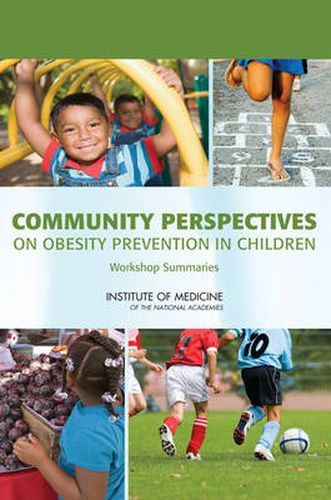Readings Newsletter
Become a Readings Member to make your shopping experience even easier.
Sign in or sign up for free!
You’re not far away from qualifying for FREE standard shipping within Australia
You’ve qualified for FREE standard shipping within Australia
The cart is loading…






As the public health threat of childhood obesity has become clear, the issue has become the focus of local, state, and national initiatives. Many of these efforts are centered on the community environment in recognition of the role of environmental factors in individual behaviors related to food and physical activity. In many communities, for example, fresh produce is not available or affordable, streets and parks are not amenable to exercise, and policies and economic choices make fast food cheaper and more convenient than healthier alternatives. Community efforts to combat obesity vary in scope and scale; overall, however, they remain fragmented, and little is known about their effectiveness. At the local level, communities are struggling to determine which obesity prevention programs to initiate and how to evaluate their impact. In this context, the Institute of Medicine held two workshops to inform current work on obesity prevention in children through input from individuals who are actively engaged in community and policy-based obesity prevention programs. Community perspectives were elicited on the challenges involved in undertaking policy and programmatic interventions aimed at preventing childhood obesity, and on approaches to program implementation and evaluation that have shown promise. Highlights of the workshop presentations and discussions are presented in this volume. –Publisher’s description.
$9.00 standard shipping within Australia
FREE standard shipping within Australia for orders over $100.00
Express & International shipping calculated at checkout
As the public health threat of childhood obesity has become clear, the issue has become the focus of local, state, and national initiatives. Many of these efforts are centered on the community environment in recognition of the role of environmental factors in individual behaviors related to food and physical activity. In many communities, for example, fresh produce is not available or affordable, streets and parks are not amenable to exercise, and policies and economic choices make fast food cheaper and more convenient than healthier alternatives. Community efforts to combat obesity vary in scope and scale; overall, however, they remain fragmented, and little is known about their effectiveness. At the local level, communities are struggling to determine which obesity prevention programs to initiate and how to evaluate their impact. In this context, the Institute of Medicine held two workshops to inform current work on obesity prevention in children through input from individuals who are actively engaged in community and policy-based obesity prevention programs. Community perspectives were elicited on the challenges involved in undertaking policy and programmatic interventions aimed at preventing childhood obesity, and on approaches to program implementation and evaluation that have shown promise. Highlights of the workshop presentations and discussions are presented in this volume. –Publisher’s description.